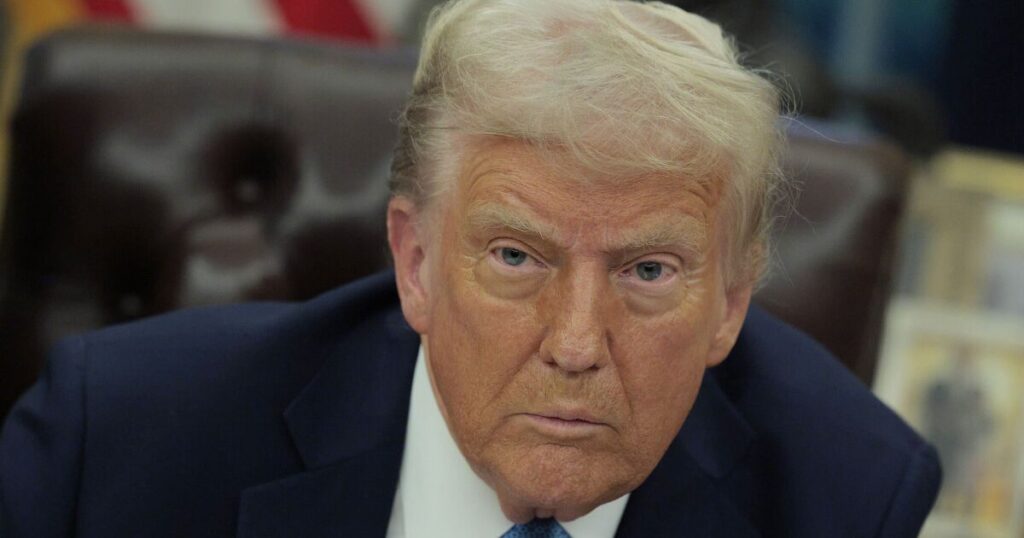
London’s FTSE 100 Index tumbled more than 1% on opening after US President Donald Trump announced a wave of tariffs and warned the European Union would be next.
The blue chip share index fell 105.8 points to 8568.2 – a fall of 1.2% – soon after the London market began trading at 8am.
Mr Trump said tariffs on imports from Europe were coming and did not rule out imposing tariffs on UK goods, but reportedly said the situation with Britain “can be worked out”.
Asia shares also mostly fell in Monday trading as worries grow about President Donald Trump imposing tariffs on key US trading partners.
Japan’s benchmark Nikkei 225 lost 2.7% to finish at 38,520.09. Australia’s S&P/ASX 200 declined 1.8% to 8,379.40. South Korea’s Kospi dropped 2.5% to 2,453.95. Hong Kong’s Hang Seng dipped 0.3% to 20,160.42, while trading was closed in Shanghai for a holiday.
Analysts said Asian markets were bracing for volatility set off by a possible trade war escalation.
Yeap Jun Rong, market strategist at IG, said: “The implications for trade restrictions could result in reduced global trade flows, supply chain shifts, which could mean higher costs for businesses, and higher inflation.”
Wall Street ended last week lower, with the S&P 500 falling 0.5% and the Nasdaq composite dropping 0.3%. The indexes posted their first weekly loss in three weeks, and the Dow Jones Industrial Average fell 0.8%.
Nigel Green, CEO of global financial giant deVere Group, said: “The writing was on the wall. This was entirely foreseeable. Yet, too many market participants buried their heads in the sand, convinced that the worst wouldn’t materialise. Now, the consequences are here, and investors need to act – fast.
“Trump’s tariffs are having an impact across asset classes, from equities to bonds to commodities. The bet is that tariffs will stoke inflation and force central banks to maintain or even hike rates. This is a dangerous game.
“Stock markets, particularly in Europe and Asia, suffered significant declines, with investors scrambling to reposition their portfolios. Asian markets bore the brunt, as Hong Kong, Japan, South Korea, and Taiwan posted steep losses. Meanwhile, oil prices surged amid concerns that tariffs on Canada and Mexico could disrupt North America’s energy supply chain, pushing up fuel costs for American consumers.”
Adding to the turbulence, cryptocurrencies have not been spared. Bitcoin and Ether saw sharp declines, with the latter experiencing its steepest loss in nearly four years before partially recovering.
With investors now bracing for a prolonged period of volatility, Mr Green urged those who have not yet adjusted their portfolios should consider doing so.
He said: “The markets will remain highly reactive in the coming days and weeks. Investors must position themselves strategically to mitigate risks and seize opportunities as assets reprice.”
He warned that trade-sensitive sectors—including manufacturing, technology, and consumer goods—are expected to face sharp adjustments as companies reassess supply chains and costs.
Mr Green added: “Investors mustn’t repeat the mistake of inaction. This is the wake-up call.”
We’ll be bringing you the very latest updates, pictures and video on this breaking news story.
For the latest news and breaking news visit:** **/finance
Stay up to date with all the big headlines, pictures, analysis, opinion and video on the stories that matter to you.
Follow our social media accounts here onhttp://facebook.com/DailyExpress and @daily_express
 Latest World Breaking News Online News Portal
Latest World Breaking News Online News Portal






